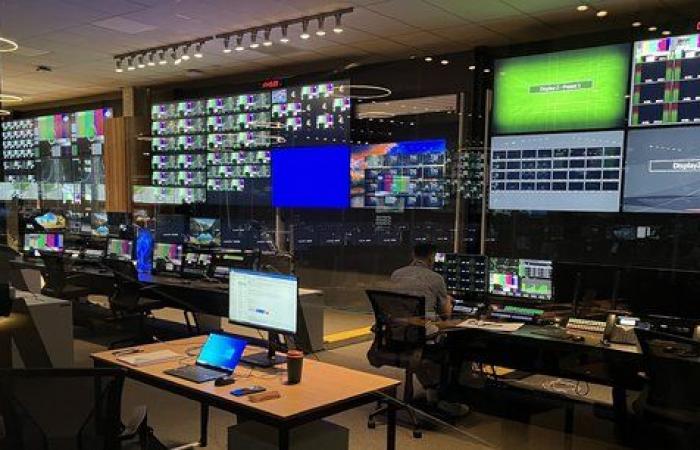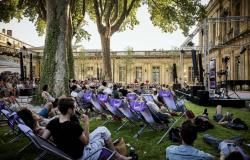It is as little known as it is vital for the smooth running of the Olympic Games. The International Broadcast Center (IBC) is not as famous as the Stade de France or La Défense Arena, which will host the competitions of the Paris 2024 Olympic Games, starting on July 26. However, it is the one that will allow the 4 billion expected viewers to not miss a thing of the event. Installed at the Parc des Expositions du Bourget (Seine-Saint-Denis), the IBC will be the convergence point for all video streams of the Olympic and Paralympic Games, before being broadcast on television channels around the world.
Olympics: Operators prepare for historic Internet traffic
As of Monday morning, the 48,000-square-meter site, whose construction began just a year ago, is not yet fully completed. However, almost all of the studios, technical rooms and other offices lined with screens are already in place. They are intended to accommodate some 15,000 journalists and technicians throughout the Olympics.
Of the 172 broadcasters of the competition, 62 of them have private spaces. They include heavyweights of the sector, such as France Télévisions, the BBC, BeIN, the Germans ARD and ZDF… But it is NBC that takes the lion’s share, with several studios and a control room. The American channel, which has the exclusive rights to the Olympic Games in the country of Uncle Sam, plans to send no less than 1,800 employees to the capital for this occasion.
Ultra-fast fiber optic connections
Within the IBC, Orange, the French number one in telecoms, plays a crucial role. Partner of the Olympic Games, the historic operator has been entrusted with all the connectivity of the event. Its teams are notably responsible for repatriating all the images from the more than 1,000 cameras deployed in all the competition locations directly to the IBC.
The exercise is often a technical challenge for its battalions of engineers. In Marseille, for example, kitesurfers will be equipped with cameras on their helmets. The images will then be transmitted over a specially deployed private 5G network, before reaching Paris via an ultra-fast fiber optic link, explains Pierre-Louis de Guillebon, the technical director of Paris 2024 for Orange.
Similarly, the cameras that will film the surfing competitions in Tahiti will send their feeds to Le Bourget via submarine telecom cables before being received on site by the television channels. Fiber optic technology plays a key role in the system. It is a gigantic web of 3,168 cables that connects the various stadiums and venues of the Olympic Games to the IBC.
In the studios, there are currently only a handful of technicians. Sitting in front of myriads of wall screens, they check that everything is running smoothly. They also carry out various tests, by running images from the last Tokyo Olympics. Each room has its own specialty. A set is reserved for receiving video streams. All signals are checked by Orange specialists, before being sent to the televisions.
If a problem occurs on a stream, for example due to a cut in a fiber optic cable, this is where they will be able to see it, locate the fault, and quickly send technicians to restore the signal. All infrastructures are, in any case, systematically « redundant “, they say in the jargon of network engineers, to avoid the disaster of a black screen.
11,000 hours of video production
In total, the organization plans to produce 11,000 hours of video throughout the Olympics. A room is also dedicated to commentators, who can follow several sporting events live on their screens. Another is reserved for cybersecurity specialists.
“We won’t tell you where it is, it is subject to special security”smiles Mario Reis, the telecommunications director of Orange Business.
The objective? To counter all the cyberattacks that are sure to occur, given the extreme sensitivity of the site. The site is also specially equipped to send all the images around the world. In addition to the traditional wired networks, the IBC has four large satellite dishes outside dedicated to transmitting around ten video streams via satellite.
All around this beating heart of the IBC, journalists and technicians will have many amenities to relax in when leaving the studios. “There are restaurants, food trucks, a supermarket, a post office, an official Olympic store, a dry cleaning service, and even a wellness area with manicures and pedicures.”says Marie Depecker, the IBC’s Broadcast and Press Director. Everything necessary, in short, to ensure that the inhabitants of this small, ephemeral town do not lack anything at any time of the day.







